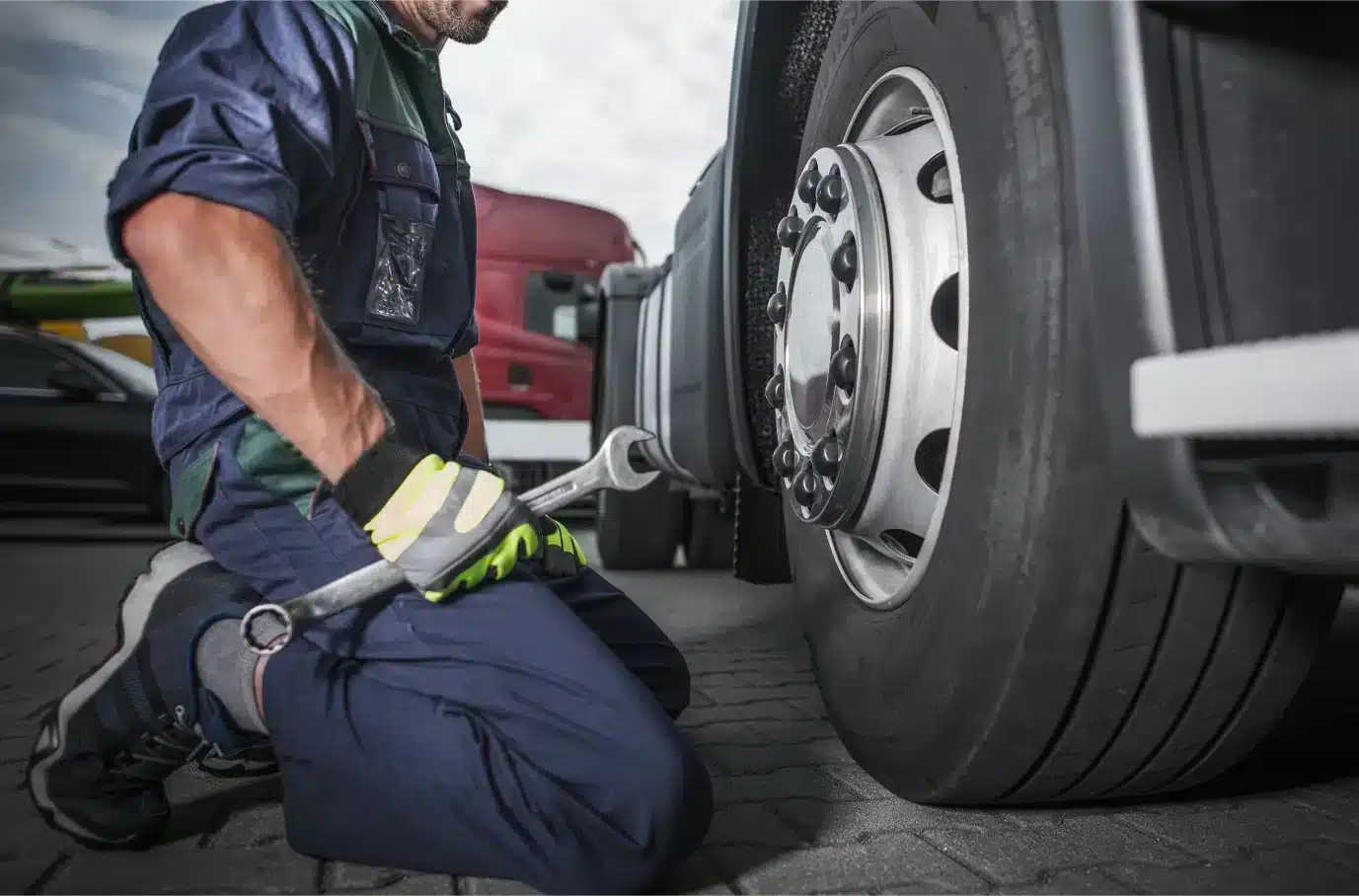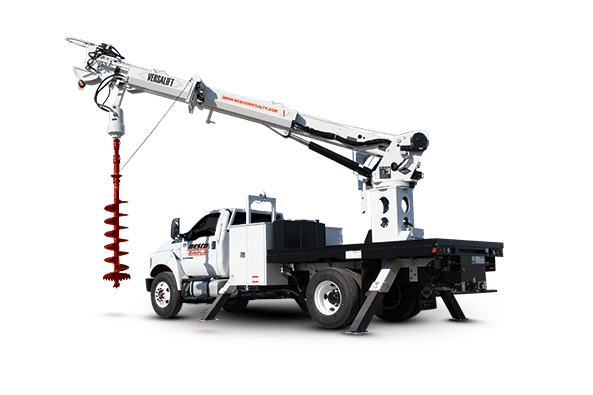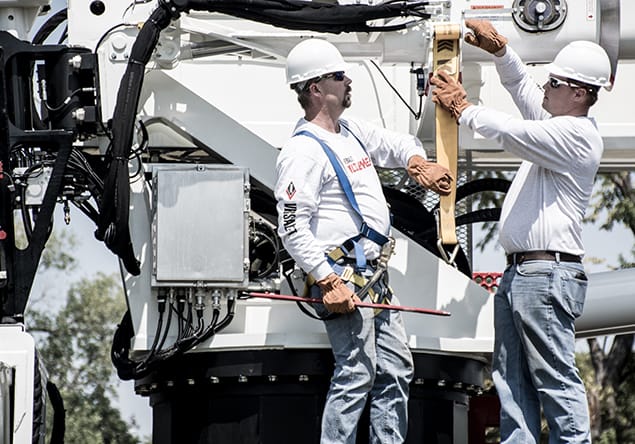One of the most effective ways to extend the lifespan of your digger derrick is by sticking to a preventive maintenance schedule. Waiting until something breaks may seem convenient in the short term, but it almost always leads to bigger problems — from extended downtime to costly component failures.
A preventive approach keeps your equipment running reliably, improves safety, and helps you spot small issues before they turn into major repairs.
Stick to Manufacturer Guidelines
Each digger derrick model is engineered with specific service intervals and care instructions. These typically include:
Following these guidelines not only protects the machine’s integrity, but also helps maintain warranty coverage.
Centralize Your Service Records
Whether you use a fleet management system or just a simple spreadsheet, it’s important to keep a detailed log of all maintenance activities — including scheduled services, fluid changes, and part replacements on your digger derrick. You can also include inspection notes to maintain a single, centralized source of information.
Prepare Your Digger Derrick for Seasonal Conditions
Environmental factors should inform your maintenance plan. For instance:
With a structured and proactive plan, your digger derrick stays ready to perform — no matter the season or site.
Interested in learning more about digger derricks? Read our articles: What is a Digger Derrick? or/and FAQ: Top Things You Need to Know About Digger Derricks

While preventive maintenance is typically scheduled and technician-led, daily and routine inspections are carried out by operators — and are just as critical to keeping your digger derrick safe and reliable.
Inspections help catch early signs of wear, misuse, or mechanical failure. When done consistently, they reduce the likelihood of accidents, breakdowns, and lost productivity.
Focus on Daily Walkarounds
Before each shift, your operator should perform a quick visual and functional check. This includes:
These checks take only a few minutes but can prevent major safety hazards or unexpected delays.
Add Weekly and Monthly Deep Dives
For more comprehensive oversight, schedule deeper inspections on a weekly or monthly basis. These should review:
Record findings directly in your centralized maintenance log — alongside service records — to create a complete equipment history.
Train Your Operators to Recognize Warning Signs
An inspection is only as good as the person performing it. Provide your team with clear guidelines on what to look for and how to report issues. Focus on pattern recognition: is something working slower, sounding different, or showing signs of strain?
Some issues aren’t meant to be handled in-house. If you spot recurring leaks, structural stress, or inconsistent performance, don’t delay — get a certified service technician involved. Acting early can prevent equipment downtime and extend the life of your machine.
How you store your digger derrick when it’s not in use can have a big impact on its long-term performance. Exposure to the elements, uneven ground, or improper parking practices can cause unnecessary wear — even when the truck isn’t running. By taking a few simple precautions, you can protect key components, prevent corrosion, and extend the overall lifespan of your equipment.
Avoid Prolonged Exposure to the Elements
UV rays, rain, ice, and extreme temperatures can all take a toll on your digger derrick — especially when it’s left out for extended periods. Over time, this exposure can:
Whenever possible, park the unit under cover — such as a shed, awning, or enclosed garage. If indoor storage isn’t available, use a heavy-duty weatherproof cover that protects key systems without trapping moisture.
Prepare Your Digger Derrick for Inactivity
If the digger derrick will be idle for more than a few weeks, it’s important to take protective steps:
These measures help preserve the truck’s mechanical systems and ensure a smooth restart when it’s time to get back to work.
Establish a Storage Routine
Storing your equipment properly shouldn’t be an afterthought — it should be part of your regular operating procedures. Assign responsibility for end-of-day and seasonal storage prep, and include storage checks in your maintenance log.

When it comes to repairs and replacement parts for your digger derrick, cutting corners can cost you more than you save. Using OEM (Original Equipment Manufacturer) parts and working with approved service providers is one of the most reliable ways to protect both the performance and the lifespan of your machine.
OEM Parts Ensure Compatibility and Longevity
OEM parts are designed, tested, and certified specifically for your digger derrick model. They match the original specifications exactly — which means:
Non-OEM parts may look similar, but even slight variations in materials or tolerances can cause long-term damage or reduce performance.
Protect Your Warranty and Compliance
Using third-party components or unauthorized repair services can void your equipment warranty, and potentially put you out of compliance with OSHA, ANSI, or DOT regulations. OEM parts and factory-trained technicians help you stay protected legally and financially.
In short: if your equipment is still under warranty, or you’re working on regulated job sites, OEM is not just the best option — it’s often the required one.
Authorized Service Providers Know Your Equipment
Certified service partners — like those in the Versalift network — are trained specifically on your digger derrick’s systems, controls, and service protocols. That means:
In contrast, general service shops may overlook critical safety systems or miss subtle signs of wear unique to your equipment.
Consistency Leads to Long-Term Savings
While OEM parts and authorized service may seem like a higher upfront cost, they deliver significant value over time:
Choosing OEM parts and working with trusted service providers isn’t just about quality — it’s about consistency, safety, and return on investment. When the job (and your reputation) is on the line, using the right parts and the right people is always the smart move.
It may sound obvious, but it’s worth repeating: using your digger derrick within its designed limits is one of the most critical ways to extend its lifespan. Operators and crews are often under pressure to get the job done quickly, which can lead to cutting corners, pushing boundaries, or using the equipment for tasks it wasn’t meant to handle.
The result? Increased wear, structural fatigue, hydraulic strain, and in worst cases — catastrophic failure.
Respect the Load Charts and Operating Limits of Your Digger Derrick
Every digger derrick comes with detailed load capacity charts based on boom extension, sheave height, and load radius. These charts aren’t suggestions — they’re engineered safety limits.
Key things to keep in mind:
Make sure these charts are visible in the cab or control panel and that operators are trained in how to read and apply them on-site.
Avoid Using the Digger Derrick for Unintended Tasks
While a digger derrick is a highly capable tool, it’s not a jack-of-all-trades. Using it for tasks it wasn’t designed for — like towing, prying, or lifting objects at awkward angles — puts unnecessary strain on the boom, turntable, and hydraulics.
Misuse may not cause immediate damage, but over time, it accelerates internal wear and shortens component life.
Mind the Load — Not Just the Weight
It’s not just about how heavy a load is — it’s also about how it moves. Swinging, unbalanced, or poorly rigged loads can create dynamic forces that exceed design limits. Always:
This is especially critical when working in uneven terrain or windy conditions.
Train for Caution, Not Assumption
Sometimes, overloading happens unintentionally — because an operator assumes the machine can handle it. A strong training culture helps prevent this by teaching crews to rely on specs and procedures, not guesswork or “feel.”
Encourage a mindset of mechanical respect — where the machine is treated as a precision tool, not a brute force device.
Avoiding overloading and misuse isn’t just about safety — it’s about preserving the equipment you rely on every day. The better you treat your digger derrick, the longer it will deliver dependable performance in the field.
Need expert advice on our digger derricks? Get in touch with our team here.
Explore related posts to learn more about Versalift’s products, customer stories, industry updates, and how we support essential infrastructure through innovation and service.
Advanced safety features like TruGuard™ and SlopeMax.
Our QA247 is the foundation of every product we assemble.
Heavyweight Performance – Best in class payloads and lighter chassis options.
We design our products with easy maintenance in mind.

Have questions about our bucket trucks or need help finding the right solution? Fill out the form below, and a member of our team will get back to you shortly.